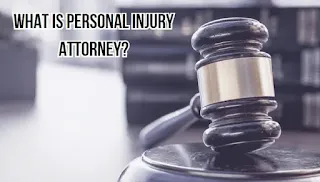Accidents and unexpected events are a part of life, and unfortunately, they can cause physical, emotional, and financial hardship. When these accidents are caused by the negligence or wrongdoing of another party, injured persons may be entitled to receive compensation for their losses. This is where a personal injury attorney comes in handy.
In this comprehensive guide, we'll explore the world of personal injury law, the role of a personal injury attorney, their responsibilities, the types of cases they handle, and all the differences in putting their expertise on your side. Why can Your pursuit of justice
Personal injury law is a branch of civil law that covers a wide range of cases where harm has been caused to persons due to the negligence or intentional acts of another. The primary purpose of personal injury law is to provide victims with a legal avenue to seek compensation for physical, emotional, and financial damages resulting from the incident.
What is personal injury Attorney?
A personal injury attorney is a legal professional who specializes in representing individuals who have been injured in accidents or incidents caused by the negligence of others. These lawyers provide valuable guidance and legal representation to help victims navigate the complex legal process of seeking compensation. Their role includes a variety of responsibilities, including:
Personal injury attorneys evaluate the details of a case to determine its merits and ability to obtain compensation. They consider factors such as liability, damages, and evidence. It is very important to develop a sound legal strategy according to the specific circumstances of the case. Personal injury attorneys decide on the best course of action to maximize their clients' chances of a successful outcome.
Many personal injury cases are settled out of court through negotiations. Attorneys negotiate with insurance companies or opposing parties to obtain a fair settlement that covers their client's losses. If no settlement can be reached, personal injury attorneys are prepared to take the case to court. They advocate for their clients in front of judges and juries, presenting evidence and arguments to support the claim.
Personal injury lawyers act as strong advocates for their clients, ensuring that their rights are protected and that they receive fair compensation for their losses. After reading this post you must read about other topics such as Local Car Accident Lawyers.
Types of Personal Injury Cases
Personal injury attorneys handle many different types of cases, each with their own unique complexities. Some common types of personal injury cases include:
- Car Accidents: Accidents involving cars, trucks, motorcycles, or pedestrians often result in serious injuries. Personal injury attorneys help victims pursue claims against negligent drivers and insurance companies.
- Slips and falls: Property owners have a duty to maintain a safe place. Lawyers help those injured by dangerous conditions on someone else's property.
- Medical malpractice: When medical professionals' negligence causes harm, personal injury lawyers hold them accountable for their actions.
- Product Liability: Defective products can cause injuries. Personal injury lawyers help consumers recover compensation from manufacturers, distributors, or retailers.
- Workplace Accidents: Employees injured on the job may be entitled to more compensation than workers' compensation. Attorneys navigate the complexities of employer liability and third-party claims.
- Dog bites: Injuries from dog attacks are often covered under personal injury law. Attorneys help victims recover damages from negligent pet owners.
Why You Need a Personal Injury Attorney?
- Personal injury law is complex, and lawyers have a deep understanding of its nuances, laws, and regulations.
- Attorneys can accurately estimate the value of your case, calculating both current and future damages.
- Experienced attorneys are skilled negotiators who can obtain fair settlements from insurance companies or opposing parties.
- Lawyers have access to resources such as medical experts, accident reconstructionists, and investigators, which make your case stronger.
- Dealing with legal issues while recovering from injuries can be stressful. Lawyers handle legal complications, allowing you to focus on healing.
The Legal Process: From Consultation to Resolution
- Initial Consultation: The process begins with an initial consultation where you discuss the details of your case with a lawyer. They assess the viability of your claim and explain your legal options.
- Case Investigation: Lawyers gather evidence, such as medical records, accident reports, and witness statements, to build a strong case.
- Demand letter: If negotiations are ongoing, your attorney sends a demand letter that outlines your damages and compensation expectations to the opposing party.
- Negotiations or litigation: Depending on the answer, negotiations may begin. If no settlement is reached, the case may go to court.
- Trial: Attorneys appear in court advocating for your rights and pursuing the compensation you deserve.
- Resolution: If successful, your case ends with a settlement or court decision. Compensation is awarded to cover medical expenses, lost wages, pain and suffering, and other damages.
Provision of Contingency Fees
How Personal Injury Attorneys Maximize Compensation
Frequently Asked Questions About Personal Injury Lawyers
- Q: How much does it cost to hire a personal injury attorney?
- Q: What should I do immediately after an accident?
- Q: How long does it usually take for personal injury cases to settle?
- Q: Will I be prosecuted?
- Q: Can I change lawyers if I am not satisfied with my current representation?




0 Comments